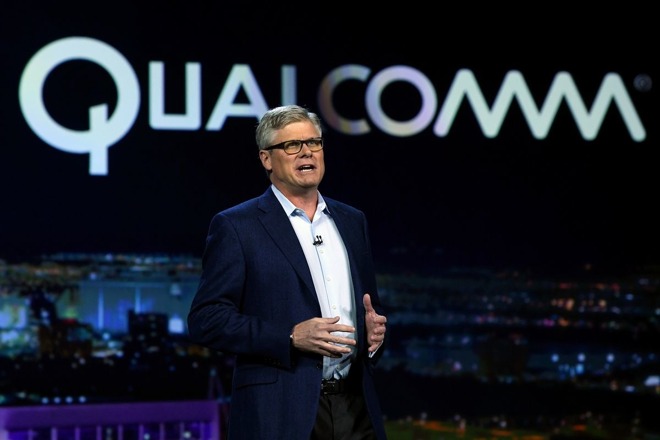Qualcomm sees 'crazy' sales rise from iPhone 12 demand
Modem maker Qualcomm says that its sales rose 62% year on year, because of demand for the 5G chipset in the iPhone 12 range.

Qualcomm CEO Steve Mollenkopf
Following Apple's strong earnings from the iPhone 12 range, modem chipset maker Qualcomm has now also reported higher year on year sales growth because of these phones. The company saw a 62% rise to $8.24 billion in the last quarter.
According to the Wall Street Journal, net income was $2.46 billion for the quarter. This beat analysts' expectations of $2.09 billion, though sales had been predicted to be slightly more at $8.27 billion.
"The chip business is really growing like crazy," outgoing CEO Steve Mollenkopf said. "It's all the things we've been talking about --growth in content and growth in devices that's significant sequentially and year over year."
Apple is reported to be developing its own 5G modems for the next iPhone, but Qualcomm says it believes it will benefit from the changing smartphone market.
"Huawei shedding so much share provides a big opportunity for us to grow," continued Mollenkopf. "The addressable market has grown, so that'll start to be a bit of a tailwind for us as we get supply and have the ability to go after it."
"Demand is far exceeding supply right now, which is something I think is going to be normalized over the next several quarters," he added.

Qualcomm CEO Steve Mollenkopf
Following Apple's strong earnings from the iPhone 12 range, modem chipset maker Qualcomm has now also reported higher year on year sales growth because of these phones. The company saw a 62% rise to $8.24 billion in the last quarter.
According to the Wall Street Journal, net income was $2.46 billion for the quarter. This beat analysts' expectations of $2.09 billion, though sales had been predicted to be slightly more at $8.27 billion.
"The chip business is really growing like crazy," outgoing CEO Steve Mollenkopf said. "It's all the things we've been talking about --growth in content and growth in devices that's significant sequentially and year over year."
Apple is reported to be developing its own 5G modems for the next iPhone, but Qualcomm says it believes it will benefit from the changing smartphone market.
"Huawei shedding so much share provides a big opportunity for us to grow," continued Mollenkopf. "The addressable market has grown, so that'll start to be a bit of a tailwind for us as we get supply and have the ability to go after it."
"Demand is far exceeding supply right now, which is something I think is going to be normalized over the next several quarters," he added.

Comments
Pent up demand from Apple.
Huawei prevented from competing.
Rolling demand from existing 5G customers.
When the spikes from these 'exceptional' situations have passed, there will be a return to business as usual. There are no long terms gains here.
Samsung and Mediatek are ramping their own 5G efforts.
Apple will eventually reduce its dependence on QC hardware (but not patents).
Huawei will be back. In fact it had been on a year's long reduction of QC chipsets anyway until the first US ban came along. With the second move, Honor was split off and was able to place orders with QC again.
But being in the right place at the right time helps a lot.
Qualcomm alone benefits with knockoff devices from Huawei and others.
Apple was in the wrong place at the wrong time and, IMO, made critical strategic errors along the way. The fact that it is seeing a resurgence in unit sales due to changes in handset business model, pent up demand, more competitive hardware etc does not resolve the core issue with Apple's 5G plan.
They are still behind as a result.
They abandoned the gigantic and costly legal initiative against QC.
They had to enter a multi-year agreement with the same company.
They basically had no other realistic options.
They couldn't get the modem on-SoC (competitors do, and are shipping third gen designs).
The one they do have is old (announced in 2019)
Using that part has seemingly forced them to not be able to implement other improvements like ultra fast screen refresh rates.
If all that wasn't bad enough already, they had to purchase intel's half cooked efforts, hire new talent and begin walking down the long road to designing their own modem and getting it on-SoC.
All the while still forking out money to the core patent holders (QC included of course).